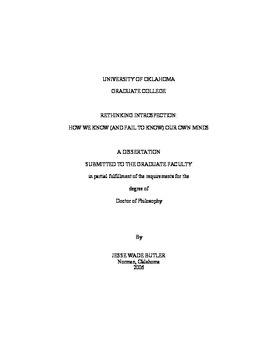| dc.description.abstract | In this dissertation I offer a new framework for understanding introspection, characterizing it as a multi-faceted phenomenon that has a broad range of epistemic qualities. I begin by arguing that the standard understanding of introspection as a kind of perception through which we observe our own minds is misguided as a literal account of introspection. With this established, I move on to discuss our diverse abilities to know, and fail to know, our own minds. First, I describe the uniquely first-person experiential knowledge that we have in virtue of being constituted by our own conscious mental states. Second, I illustrate how we know about our own minds through higher-order cognitive abilities, through which we represent, conceptualize, and pay attention to aspects of our own minds in much the same way that we do in understanding the world around us. Finally, I present and discuss several different ways in which language, through the phenomenon of inner speech, contributes to our ability to introspect. Throughout this project, one prominent goal is to map out the varied epistemic dimensions of introspection. Some kinds of introspection provide unique ways of knowing our own minds that are not subject to typical epistemic error, such as the experiential self-knowledge intrinsic to being in a conscious state. However, many other kinds of introspection are subject to error, such as the inherent capacity to misrepresent anything that is mediated through conceptual and representational thought and the capacity to deceive ourselves through the narratives we construct in inner speech. In addition, we can also engage in self-constitutive mental processes, such that what we know about ourselves can at times be a function of what we ourselves determine. Taking note of these diverse aspects of introspection provides a foundational framework for further empirical inquiry and conceptual analysis, whereby the broad range of introspective activities we engage in, along with the impacts they have on both our ordinary lives and our intellectual investigations into the nature of the mind, can be more accurately understood, evaluated, and utilized. | en_US |
